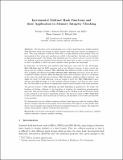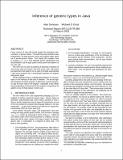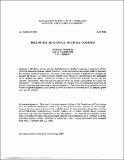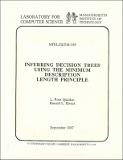Browsing Computer Science and Artificial Intelligence Lab (CSAIL) by Title
Now showing items 1618-1637 of 3804
-
The Incremental Garbage Collection Processes
(1977-12-01)This paper investigates some problems associated with an expression evaluation order that we call "future" order, which is different from call-by-name, call-by-value, and call-by-need. In future order evaluation, an ... -
Incremental Multiset Hash Functions and their Application to Memory Integrity Checking
(2003-05)We introduce a new cryptographic tool: multiset hash functions. Unlike standard hash functions which take strings as input, multiset hash functions operate on multisets (or sets). They map multisets of arbitrary finite ... -
The Incremental Rigidity Scheme for Recovering Structure from Motion: Position vs. Velocity Based Formulations
(1985-10-01)Perceptual studies suggest that the visual system uses the "rigidity" assumption to recover three dimensional structures from motion. Ullman (1984) recently proposed a computational scheme, the incremental rigidity ... -
Incremental Simulation on a Time-shared Computer
(1968-01)This thesis describes a system which allows simulation models to be built and tested incrementally. It is called OPS-4 and is specifically designed to operate in the environment of the Multics system. It represents a ... -
An Incremental Type Inference System for the Programming Language ID
(1990-11)Modern computing environments strive to be robust and reliable, and at the same time, aim at providing enough flexibility to an interactive user to edit, debug, and test programs easily and efficiently. -
Index Selection in a Self-Adaptive Relational Data Base Management System
(1976-09)The development of large integrated data bases that support a variety of applications in an enterprise promises to be one of the most important data processing activities of the next decade. The effective utilization o ... -
Indexing for Visual Recognition from a Large Model Base
(1990-08-01)This paper describes a new approach to the model base indexing stage of visual object recognition. Fast model base indexing of 3D objects is achieved by accessing a database of encoded 2D views of the objects using a ... -
The Individual is Nothing, the Class Everything: Psychophysics and Modeling of Recognition in Obect Classes
(2000-05-01)Most psychophysical studies of object recognition have focussed on the recognition and representation of individual objects subjects had previously explicitely been trained on. Correspondingly, modeling studies have often ... -
Indolent Closure Creation
(1998-06)A closure is a representation of a thread in memory, ready to be executed. The goal of this work is to create portable closures that can be transferred across binary incompatible architectures. Consequently, indolent ... -
Induction in Proofs about Programs
(1972-02)Four methods for proving equivalence of programs by induction are described and compared. They are recursion induction, structural induction, mu-rule induction, and truncation induction. McCarthy's formalism for conditional ... -
Infants in Children Stories - Toward a Model of Natural Language Comprehension
(1972-08-01)How can we construct a program that will understand stories that children would understand? By understand we mean the ability to answer questions about the story. We are interested here with understanding natural ... -
Inference and Regeneration of Programs that Manipulate Relational Databases
(2017-08-29)We present a new technique that infers models of programs that manipulate relational databases. This technique generates test databases and input commands, runs the program, then observes the resulting outputs and updated ... -
Inference and Regeneration of Programs that Store and Retrieve Data
(2017-04-24)As modern computation platforms become increasingly complex, their programming interfaces are increasingly difficult to use. This complexity is especially inappropriate given the relatively simple core functionality that ... -
Inference of Generic Types in Java
(2003-03)Future versions of Java will include support for parametric polymorphism, or generic classes. This will bring many benefits to Java programmers, not least because current Java practise makes heavy use of pseudo-generic ... -
Inferring 3D Shapes from 2D Codons
(1985-04-01)All plane curves can be described at an abstract level by a sequence of five primitive elemental shapes, called "condons", which capture the sequential relations between the singular points of curvature. The condon ... -
Inferring 3D Structure with a Statistical Image-Based Shape Model
(2003-04-17)We present an image-based approach to infer 3D structure parameters using a probabilistic "shape+structure'' model. The 3D shape of a class of objects may be represented by sets of contours from silhouette views ... -
Inferring Decision Trees Using the Minimum Description Length Principle
(1987-09)We explore the use of Rissanen's Minimum Description Length Principle for the construction of decision trees. Empirical results comparing this approach to other methods are given. -
Inferring Shape from Motion Fields
(1980-12-01)The human visual system has the ability o utilize motion information to infer the shapes of surfaces. More specifically, we are able to derive descriptions of rigidly rotating smooth surfaces entirely from the orthographic ... -
Information Accountability
(2007-06-13)Ease of information flow is both the boon and the bane of large-scale, decentralized systems like the World Wide Web. For all the benefits and opportunities brought by the information revolution, with that same revolution ...



















